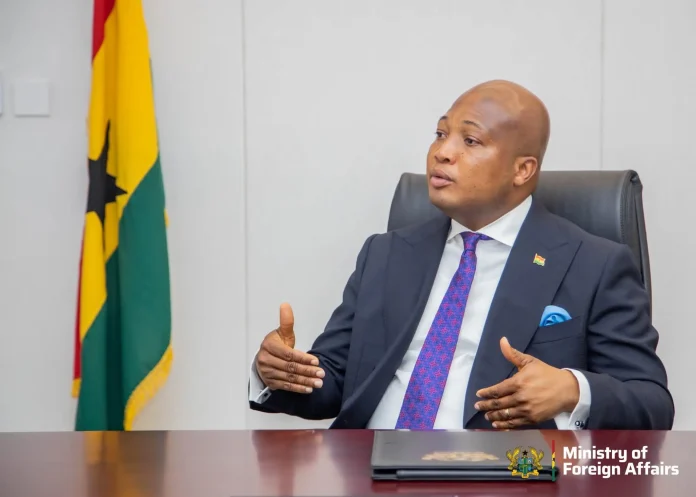Ghana’s Foreign Minister Samuel Okudzeto Ablakwa has expressed heartfelt gratitude to Burkina Faso and Côte d’Ivoire for providing refuge to thousands of Ghanaians fleeing deadly communal violence in the country’s northern Savannah Region.
The diplomatic outreach comes as Ghana grapples with its worst internal displacement crisis in recent years. More than 13,000 Ghanaians have crossed into neighboring Côte d’Ivoire, while others sought shelter in Burkina Faso following violent clashes that began on August 23, 2025. The conflict has claimed at least 31 lives and displaced nearly 50,000 people from their homes.
Speaking from Ethiopia where he is conducting official duties, Ablakwa held telephone conversations with his counterparts in both countries. He spoke with Burkina Faso’s Foreign Minister Karamoko Jean-Marie Traoré and Côte d’Ivoire’s Foreign Minister Kacou Houadja Léon Adom to coordinate support for the displaced citizens.
“I conveyed the heartfelt appreciation of President John Mahama, the government and people of Ghana for their demonstration of true Pan-African solidarity,” Ablakwa stated in a social media post. The minister praised both nations for their commitment to ECOWAS free movement protocols during this humanitarian crisis.
The violence erupted over a land dispute in the village of Gbiniyiri, quickly spreading across the region and forcing families to abandon their homes and livelihoods. The crisis has tested Ghana’s reputation as a stable democracy in a region frequently plagued by conflict and instability.
Both foreign ministries have agreed to urgent meetings with Ghana’s embassy officials to develop enhanced mechanisms for protecting and supporting the displaced citizens. The discussions produced what Ablakwa described as a clear roadmap for ensuring affected Ghanaians receive proper care and support for their eventual return home.
Ablakwa announced plans for working visits to both countries, facilitated by his counterparts who offered to accompany him when visiting the displaced communities. These visits will occur after he concludes high-level commitments in Ethiopia alongside Vice President Naana Jane Opoku-Agyemang.
Recent reports indicate some progress in addressing the crisis, with more than 65 percent of Ghanaians who fled to Côte d’Ivoire reportedly returning home as peacebuilding efforts take hold. The Ghanaian government has established a mediation committee to address the underlying causes of the conflict and prevent future violence.
The crisis highlights both the challenges facing West African nations and the strength of regional solidarity in times of need. ECOWAS protocols allow free movement across member state borders, but the current situation tests these agreements under emergency conditions.
Ablakwa concluded his statement with a call for lasting peace across Ghana’s conflict-prone areas. He emphasized the Mahama Administration’s commitment to caring for all citizens, declaring that the government “will not leave anyone behind.”
The minister also invoked the spirit of Pan-Africanism, encouraging continued border openness among African nations. “May we in the spirit of Pan-Africanism and African integration continue to open our borders to fellow Africans as Ghana has always championed, even as we pursue the dream of a borderless Africa,” he said.
The displacement crisis represents a significant test for President Mahama’s administration, which took office in January 2025. How effectively Ghana manages both the immediate humanitarian needs and long-term peacebuilding efforts will likely influence regional stability and the country’s standing within ECOWAS.
Source: newsghana.com.gh











